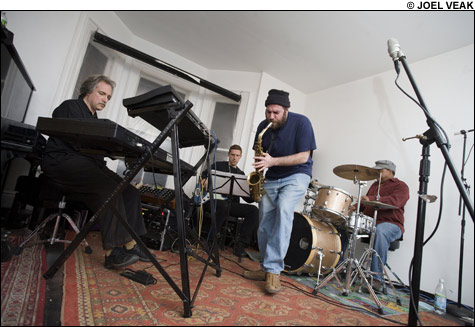
BIG FOUR: The Outpost was just small enough for Bryant, Rivard, Merenda, and Jones. |
WFNX Jazz Brunch Top Five
1. Will Bernard, Blue Plate Special [Palmetto]
2. Wave Mechanics Union, Second Season [HX Music]
3. Paul Shapiro, Essen [Tzadik]
4. Buena Vista Social Club, Live at Carnegie Hall [World Circuit]
5. Christian Scott, Live at Newport [Concord] |
Dave Bryant stood among the folding chairs in the audience before Scarecrow Mobius's gig at Outpost 186 a week ago Monday night, looked at his two-deck keyboard rig, and mused, "Not pretty, but I guess it will do. I had more room at rehearsal."The Outpost performance space, booked by indefatigable jazz-and-improv presenter Rob Chalfen, is too small and just about perfect for jazz — living-room-sized. Which means James Merenda, the band's saxophonist, can play unamplified against Bryant's electric keyboards, Mike Rivard's electric bass, and James Kamal Jones's uninhibited drums. Of course, Merenda is no shrinking violet. (Bearded, gregarious, exuberant — is he the Mandy Patinkin of Boston avant-jazz? Just a thought.)
Everyone in Bryant's band is a leader in his own right. He and Jones have logged serious time with Ornette Coleman, so there are some Ornette tunes and some Bryant originals, and when Bryant refers to "old standards," he's talking about a couple of late-'60s Miles Davis–associated electric numbers, "In a Silent Way" (which you can hear mod-thinking jazz bands play once in a blue moon) and A Tribute to Jack Johnson's "Right Off" — which no one plays, ever.
But first up is Ornette's "City Living," with the skittery-fast tight keyboard/sax line over funk bass-and-drums. It's a tune that accelerates quickly, then drifts into the kind of free-fourway collective improv that Ornette's music is designed for and that brings Rivard out of his seat. There's a round of solos, a quieting down to Jones's solo before he cues the theme back with his bass drum, a round of loose fours between Merenda and Bryant, and then the fast theme and a cold stop.
Bryant's tunes are as catchy as Ornette's. His "Lime Pickles" floats on a medium tempo that moves in and out of a swing groove, drifts in harmony and rhythm, comes back to cadence and time. Merenda takes the Ornette imperative to heart, playing not patterns or scales but pure melody or, when he works up a head of steam, broad rhythmic gestures. Throughout the set, he tends to stomp and dance and lift the bell of his horn toward the ceiling; at one point he seems about ready to jump up backwards on a folding chair before his leg thinks better of it and comes back down on the floor.
The prize of the first set may have been Merenda's arrangement of "Mob Job," a tune that Ornette has recorded at least a few times. Jones and Merenda play medium-slow long-lined funk, Merenda floating Ornette's odd phrase lengths over the groove, in synch or not, the one constant being the build-up of tension and release as the form crescendos to Jones's cymbal smashes on the turn-around. It's a relaxed, unpredictable off-kilter groove, Jones embellishing freely within it, always coming back to tempo with Rivard, the piece ending with just bass and drums, Jones rocking back and forth between hi-hat and snare, tock and sizzle.